|
De Romeinse dichter en schrijver Quintus Horatius Flaccus werd geboren op 8 december 65 v. Chr. Zie ook alle tags voor Horatius op dit blog.
Ode II.18
Geen elpenbeen en geen verguld plafond
blinkt in mijn huis. Geen balkwerk van albast
rust daar op een porfieren zuilenrij.
Ik heb niet van een onbekenden neef
een Pergameenschen koningsburcht geërfd.
Op mijn klandizie drijft geen purperzaak.
Maar trouw van hart en niet van geest ontbloot
eert mij de vriendschap van een edelman.
Neen noch den goden noch mijn rijken vriend
vraag ik om meer, gelukkig en voldaan
met mijn geliefd Sabinum. Zie, de dag
volgt op den dag, de maand volgt op de maand,
en gij bestelt een marmermozaiek,
alsof de dood niet aldoor nader kwam,
bouwt huizen midden in het golfgeklots,
alsof het zeestrand niet toereikend was.
Ja zelfs het dubbel heilig grondbezit
van arme buren waagt uw hand te schenden.
Daar gaan zij, man en vrouw, van huis en haard
verdreven, met hun eenig eigendom,
hun havelooze kindren op den arm.
Maar ook den rijken heer wacht geen paleis
zoo zeker als dat van den wissen dood.
Wat wilt gij altijd meer? Voor arm en rijk
ontsluit de aarde zonder onderscheid
haar duistren schoot. Zelfs voor Prometheus' goud
was geen retour aan Charons veer te koop.
Daar zuchten Tantalus en zijn geslacht,
daar vindt een arme stakker eindlijk rust.
De dood verhoort wie roept, en wie niet roept.
Vertaald door Dr. A. Rutgers van der Loeff
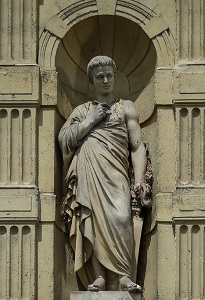
Horatius (8 december 65 v. Chr. – 27 november 8 v. Chr.)
Standbeeld in Parijs
De Amerikaanse dichter en schrijver William Hervey Allen werd geboren op 8 december 1889 in Pittsburgh. Zie ook alle tags voor Hervey Allen op dit blog.
The Sea-Islands
Shadows
There is deliberateness in all sea-island ways,
Outlandish to our days as stone wheels are.
The islands cannot see the use of life
Which only lives for change;
Their days are flat,
And all things there move slowly.
Even the seasons are conservative—
No sudden flaunting of wild colors in the fall,
Only a gradual fading of the green,
As if the earth turned slowly,
Or looked with one still face upon the sun
As Venus does; Until the trees, the fields, the marshes,
All turn dun, dull Quaker brown, And a mild winter settles down,
And mosses are more gray.
All human souls are glasses which reflect
The aspects of the outer world.
See what terrible gods the huge Himalayas bred!—
And the fierce Jewish Jaywah came
From the hot Syrian desert
With his inhibitory decalogue.
The gods of little hills are always tame;
Here God is dull, where all things stay the same.
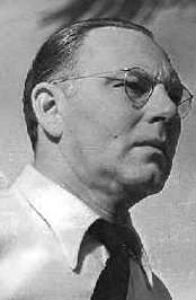
Hervey Allen (8 december 1889 – 28 december 1949)
De Amerikaanse schrijver James Thurber werd geboren op 8 december 1894 in Columbus, Ohio. Zie ook alle tags voor James Thurber op dit blog.
Uit: The Secret Life of Walter Mitty
“We’re going through!” The Commander’s voice was like thin ice breaking. He wore his full-dress uniform, with the heavily braided white cap pulled down rakishly over one cold gray eye. “We can’t make it, sir. It’s spoiling for a hurricane, if you ask me.” “I’m not asking you, Lieutenant Berg,” said the Commander. “Throw on the power lights! Rev her up to 8,500! We’re going through!” The pounding of the cylinders increased: ta-pocketa-pocketa-pocketa-pocketa-pocketa. The Commander stared at the ice forming on the pilot window. He walked over and twisted a row of complicated dials. “Switch on No. 8 auxiliary!” he shouted. “Switch on No. 8 auxiliary!” repeated Lieutenant Berg. “Full strength in No. 3 turret!” shouted the Commander. “Full strength in No. 3 turret!” The crew, bending to their various tasks in the huge, hurtling eight-engined Navy hydroplane, looked at each other and grinned. “The Old Man’ll get us through,” they said to one another. “The Old Man ain’t afraid of Hell!” . . .
“Not so fast! You’re driving too fast!” said Mrs. Mitty. “What are you driving so fast for?”
“Hmm?” said Walter Mitty. He looked at his wife, in the seat beside him, with shocked astonishment. She seemed grossly unfamiliar, like a strange woman who had yelled at him in a crowd. “You were up to fifty-five,” she said. “You know I don’t like to go more than forty. You were up to fifty-five.” Walter Mitty drove on toward Waterbury in silence, the roaring of the SN202 through the worst storm in twenty years of Navy flying fading in the remote, intimate airways of his mind. “You’re tensed up again,” said Mrs. Mitty. “It’s one of your days. I wish you’d let Dr. Renshaw look you over.”
Walter Mitty stopped the car in front of the building where his wife went to have her hair done. “Remember to get those overshoes while I’m having my hair done,” she said. “I don’t need overshoes,” said Mitty. She put her mirror back into her bag. “We’ve been all through that,” she said, getting out of the car. “You’re not a young man any longer.” He raced the engine a little. “Why don’t you wear your gloves? Have you lost your gloves?” Walter Mitty reached in a pocket and brought out the gloves.”
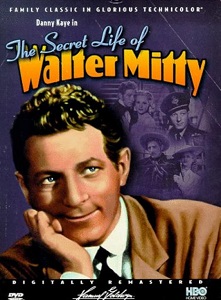
James Thurber (8 december 1894 – 2 november 1961)
Cover DVD
De Spaanse schrijfster, vertaalster en journaliste Carmen Martín Gaite werd geboren op 8 december 1925 in Salamanca. Zie ook alle tags voor Carmen Martín Gaite op dit blog.
Uit: La reine des neiges (Vertaald door Claude Bleton)
« Pour la première fois, disaient-ils, on voyait comment la terre et les êtres humains sont réellement. Ils couraient de tous côtés avec leur miroir et bientôt il n'y eut pas un pays, pas une personne qui n'eussent été déformés là-dedans.
Alors, ces apprentis sorciers voulurent voler vers le ciel lui-même, pour se moquer aussi des anges et de Notre-Seigneur. Plus ils volaient haut avec le miroir, plus ils ricanaient. C'est à peine s'ils pouvaient le tenir et ils volaient de plus en plus haut, de plus en plus près de Dieu et des anges, alors le miroir se mit à trembler si fort dans leurs mains qu'il leur échappa et tomba dans une chute vertigineuse sur la terre où il se brisa en mille morceaux, que dis-je, en des millions, des milliards de morceaux, et alors, ce miroir devint encore plus dangereux qu'auparavant. Certains morceaux n'étant pas plus grands qu'un grain de sable voltigeaient à travers le monde et si par malheur quelqu'un les recevait dans l'œil, le pauvre accidenté voyait les choses tout de travers ou bien ne voyait que ce qu'il y avait de mauvais en chaque chose, le plus petit morceau du miroir ayant conservé le même pouvoir que le miroir tout entier. Quelques personnes eurent même la malchance qu'un petit éclat leur sautât dans le cœur et, alors, c'était affreux : leur cœur devenait un bloc de glace. D'autres morceaux étaient, au contraire, si grands qu'on les employait pour faire des vitres, et il n'était pas bon dans ce cas de regarder ses amis à travers elles. D'autres petits bouts servirent à faire des lunettes, alors tout allait encore plus mal. Si quelqu'un les mettait pour bien voir et juger d'une chose en toute équité, le Malin riait à s'en faire éclater le ventre, ce qui le chatouillait agréablement. »
(…)
Il lui sembla que les vagues lui faisaient signe, alors [Gerda] enleva ses souliers rouges, ceux auxquels elle tenait le plus, et les jeta tous les deux dans l'eau, mais ils tombèrent tout près du bord et les vagues les repoussèrent tout de suite vers elle, comme si la rivière ne voulait pas les accepter, puisqu'elle n'avait pas pris le petit Kay. Gerda crut qu'elle n'avait pas lancé les souliers assez loin, alors elle grimpa dans un bateau qui était là entre les roseaux, elle alla jusqu'au bout du bateau et jeta de nouveau ses souliers dans l'eau. Par malheur le bateau n'était pas attaché et dans le mouvement qu'elle fit il s'éloigna de la rive, elle s'en aperçut aussitôt et voulut retourner à terre, mais avant qu'elle n'y eût réussi, il était déjà loin sur l'eau et il s'éloignait de plus en plus vite.
Alors la petite Gerda fut prise d'une grande frayeur et se mit à pleurer, mais personne ne pouvait l'entendre, excepté les moineaux, et ils ne pouvaient pas la porter, ils volaient seulement le long de la rive, en chantant comme pour la consoler : " Nous voici ! Nous voici ! " Le bateau s'en allait à la dérive, la pauvre petite était là tout immobile sur ses bas, les petits souliers rouges flottaient derrière mais ne pouvaient atteindre la barque qui allait plus vite."
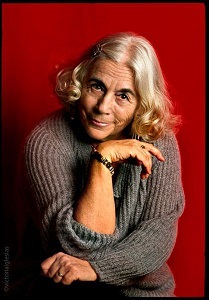
Carmen Martín Gaite (8 december 1925 – 22 juli 2000)
De Griekse dichter en schrijver Nikos Gatsos werd geboren op 8 december 1911 in Kato Asea in Arcadië. Zie ook alle tags voor Nikos Gatsos op dit blog.
Amorgos (Fragment)
So! my pallikari with wine in your kisses and leaves on your lips
I want you to plunge naked into rivers
to sing to Barbary like the carpenter hunts out the woodgrain
like the viper passes through gardens of barley
with its proud ferocious eyes
like the lightning threshes the young.
And don't laugh and don't cry and don't rejoice
don't uselessly lace up your shoes like you were planting platans
don't become FATED
because the lammergeier is not a a closed drawer
it is not a tear from a plumtree or a smile from a waterlily
nor is it an undershirt for a dove or mandolin for a Sultan
nor a silk bonnet for the head of a whale.
It is a saw from the sea that slaughters the gulls
a carpenter's cushion a beggar's clock
a fire in a gypsy's forge who seduces priests' wives and sings a lullaby for lilies
a marriage for Turks a celebration of Australians
a lair of Hungarians
where the hazelnut trees go to meet secretly in fall
they see the wise storks dying their eggs black
and they weep too
they burn their nightgowns and put on ducks' petticoats
they spread stars on the earth for kings to walk on
with their silver amulets with the crown and the purple
they spread rosemary on beds
so the mice will go to another cellar
go to other churches to eat the Holy Table
Vertaald door Anita Sullivan
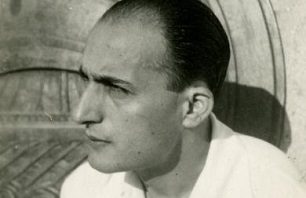
Nikos Gatsos (8 december 1911 – 12 mei 1992)
De Oostenrijkse dichter en schrijver Jura Soyfer werd op 8 december 1912 in Charkov, Oekraïne, geboren. Zie ook alle tags voor Jura Soyfer op dit blog.
Einheitsfront
Die Sowjets bedrohen, wie jeder weiß,
Den Klassenfrieden, den Erdölpreis,
Die Baumwollkurse, die Religion,
Moral und Zündholzproduktion!
Drum reichen Deterding, Vanderbilt,
Ford, Morgan und Thyssen einander die Hände:
»Hoch die Kultur, die's zu schirmen gilt,
Dreimal so hoch die Dividende!«
Um Leichenbeute wird später gestritten –
Jetzt feiern die Herren Honigmond.
»Auf denn«, ruft Krupp, »gen Ostland geritten,
Es lebe die goldene Einheitsfront!«
»Ich träumte einst von Arbeiterpartei«,
Sprach Hitler, »doch das ist längst vorbei.
Mögt ruhig sein, die ihr schafft und rafft:
Fest steht und treu die Zinsknechtschaft!«
Und neue Aufschläge gab es im Nu
Zu Uniformrock samt Hose,
Und neue Anschläge gab es dazu
Auf Krüppel und Arbeitslose.
So einten sich Hitler und die Barone.
Schon steigen glorreich am Horizont
Hohenzollernschnurrbart und Krone.
»Es lebe die braune Einheitsfront!«
Von Warschau bis Schanghai, von Süd bis Nord,
Von Essen bis Neuyork, von Thyssen bis Ford,
Von Hitler bis Horthy steht er geeint,
Der imperialistische Klassenfeind!
Sie greifen an, sie marschieren geschlossen!
Können denn wir nicht, was die gekonnt?
Die Zeit ist knapp. Zeit ist Blut, Genossen!
Genossen, schließet die Einheitsfront!
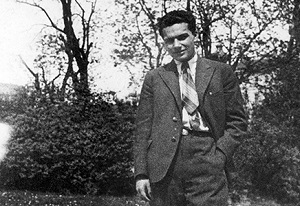
Jura Soyfer (8 december 1912 – 16 februari 1939)
De Noorse dichter, schrijver, journalist en politicus Bjørnstjerne Bjørnson werd geboren op 8 december 1832 in Kvikne bij Tynset. Zie ook alle tags voor Bjørnstjerne Bjørnson op dit blog.
When Comes The Morning?
When
comes the real morning?
When golden, the sun's rays hover
Over the earth's snow-cover,
And where the shadows nestle,
Wrestle,
Lifting lightward the root enringèd
Till it shall seem an angel wingèd,
Then it is morning,
Real, real morning.
But if the weather is bad
And my spirit sad,
Never morning I know.
No.
Truly, it's real morning,
When blossom the buds winter-beaten,
The birds having drunk and eaten
Are glad as they sing, divining
Shining
Great new crowns to the tree-tops given,
Cheering the brooks to the broad ocean riven.
Then it is morning,
Real, real morning.
But if the weather is bad
And my spirit sad,
Never morning I know.
No.
When
comes the real morning?
When power to conquer parries
Sorrow and storm, and carries
Sun to the soul, whose burning
Yearning
Opens in love and calls to others:
Good to be unto all as brothers.
Then
it is morning,
Real, real morning.
Greatest power you know
-And most dangerous, lo!-
Will you
this
then possess?
Yes.
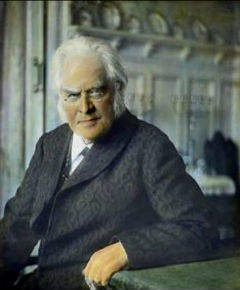
Bjørnstjerne Bjørnson (8 december 1832 – 26 april 1910)
De Amerikaanse schrijver Joel Chandler Harris werd geboren op 8 december 1848 in Eatonton, Georgia.Zie ook alle tags voor Joel Chandler Harris op dit blog.
Uit: Free Joe and Other Georgian Sketches
“The name of Free Joe strikes humorously upon the ear of memory. It is impossible to say why, for he was the humblest, the simplest, and the most serious of all God's living creatures, sadly lacking in all those elements that suggest the humorous. It is certain, moreover, that in 1850 the sober-minded citizens of the little Georgian village of Hillsborough were not inclined to take a humorous view of Free Joe, and neither his name nor his presence provoked a smile. He was a black atom, drifting hither and thither without an owner, blown about by all the winds of circumstance, and given over to shiftlessness.
The problems of one generation are the paradoxes of a succeeding one, particularly if war, or some such incident, intervenes to clarify the[4] atmosphere and strengthen the understanding. Thus, in 1850, Free Joe represented not only a problem of large concern, but, in the watchful eyes of Hillsborough, he was the embodiment of that vague and mysterious danger that seemed to be forever lurking on the outskirts of slavery, ready to sound a shrill and ghostly signal in the impenetrable swamps, and steal forth under the midnight stars to murder, rapine, and pillage—a danger always threatening, and yet never assuming shape; intangible, and yet real; impossible, and yet not improbable. Across the serene and smiling front of safety, the pale outlines of the awful shadow of insurrection sometimes fell. With this invisible panorama as a background, it was natural that the figure of Free Joe, simple and humble as it was, should assume undue proportions. Go where he would, do what he might, he could not escape the finger of observation and the kindling eye of suspicion. His lightest words were noted, his slightest actions marked.”
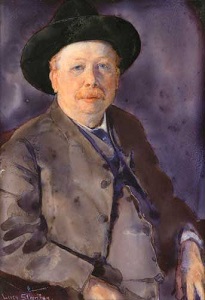
Joel Chandler Harris (8 december 1848 – 3 juli 1908)
Portret door Lucy May Stanton, ca, 1914
08-12-2018 om 09:08
geschreven door Romenu 
Tags:Horatius, Hervey Allen, James Thurber, Carmen Martín Gaite, Nikos Gatsos, Jura Soyfer, Bjørnstjerne Bjørnson, Joel Chandler Harris, Romenu
|

